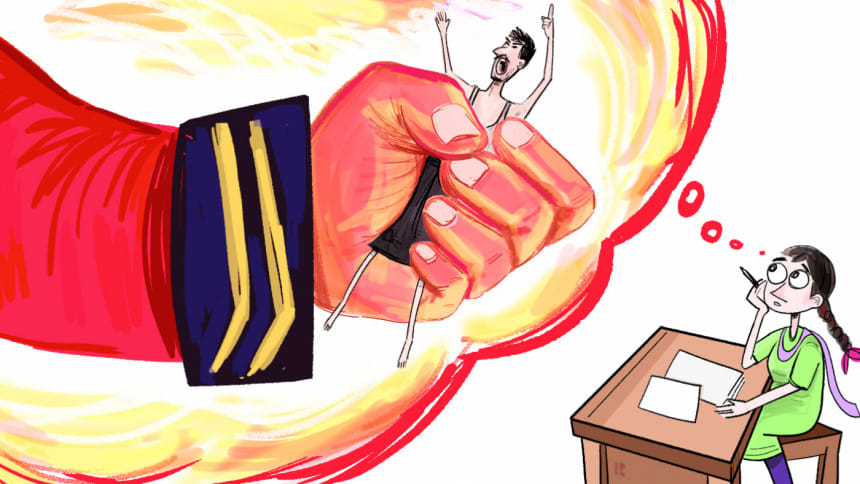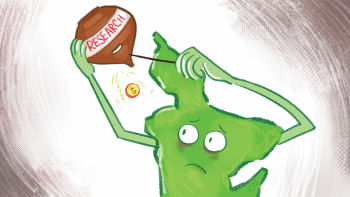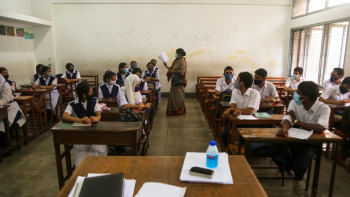What is the fracas on the Barishal uni question paper really about?

"You may have my body, but you will never have my heart/soul" – it's difficult not to cringe at the gendered language used in what may be one of the most popular storylines that regularly make an appearance in Bangla films. Dhallywood is hardly famous for its feminist commentary – too many of its productions centre on the heroine's "honour," to be saved by the male hero, and the "shame" that the villain of the story is trying to bring upon her – and the fact that attempted rape scenes are normalised enough to become pop culture references in Bangladesh definitely says something about us as a society.
This dialogue, however, recently created a social media storm by cropping up in a more unusual place: a question paper for Bangladesh Studies in the University of Barishal, where students were asked to examine it in the "light of British hegemony in the Indian subcontinent." The first part of the question also asked students to examine the concept of the politics of majoritarianism and the "divide and rule" policy of the British Raj.
Much of the attention that this question received was limited to ridicule, and quite a bit of it was outrage or disappointment at the state of education in the country, with many asking why such a "vulgar" statement should make it into higher education question papers. Different media outlets sniffed out the opportunity for clickbait and immediately named and shamed the associate professor responsible for setting the question, and also reached out to other members of the university administration for their opinions. Another, smaller group of netizens – mostly university students, graduates and educators – voiced their support, arguing that the parallels that could be drawn between the heroine's deho, mon and chinta, and the plunder of resources by the British Empire and the freedom of thought and revolutionary ideologies during the colonial era, could lead to a creative and critical discussion of the concept of hegemony.
While I'm not a fan of this specific quote, and I would have preferred if the question somehow allowed the student to deconstruct the toxic masculine standards behind it as well, I do appreciate the critical thinking it encourages. It is no secret that the academic culture in Bangladesh is suffering. We have seen cases of academics engaging in plagiarism in some of the most reputed universities in the country. We all know the school system is still heavily reliant on rote memorisation, and commercial guidebooks and notebooks that help students memorise their curriculum and sit for their exams have only muddied the waters further. In such an environment, any question that makes students think out of the box should be welcomed. And who knows, perhaps the discussion of British hegemony has even inspired some students to venture into discussing patriarchal structures or gendered discourse as well.
The criticism of this particular question may seem like harmless jibing at first, but when we regard it in the current context of academic freedom (or lack thereof), there are more sinister undertones here. It is impossible to ignore the irony of a question on hegemony triggering debate on what should or should not be said in our academic institutions. From what I understand, when political theorists talk about hegemony, they mean the power exercised by the ruling class to dominate, not through coercion, but by consent – by convincing the dominated that everything is being done in their best interests. And this consent is manufactured through different structures, including educational institutions and the media.
In recent times, wielding a pen (or its modern equivalent) has had consequences for many – from writers and journalists to academics and even teenage social media users, mostly under the auspices of the Digital Security Act (DSA). Over the years, we have seen quite a few examples of academics being vilified, investigated, suspended and even forced to leave for saying the "wrong" thing. Avoidance of "sensitive" topics – basically self-censorship – is now a common denominator of academic and media circles. In line with the textbooks, this policing of thought has not only come from the state, but from educational institutions and from the media itself. Remember the embarrassing brinjal episode, when journalists on a local television network publicly lambasted a researcher for daring to suggest their beloved vegetable may contain certain carcinogenic elements?
Of course, it's possible that we have all unnecessarily inflated and given traction to what is, at the end of the day, quite an inconsequential story (myself included!). But this whole "vulgar vs critical" question paper saga also gives us a rather fascinating look into how we view the acceptability of certain words and ideas. Would some people have thought this question to be more acceptable if it were issued by a department of media studies? Why are words that are widely acceptable in popular media suddenly unacceptable when they reach more high-brow avenues like higher education institutions? Would others be less interested in defending it if they did not feel a more general threat to academic freedom and critical thought? Is it possible to defend an academic's right to set interesting questions while also expressing discomfort at the rather uncritical phrasing of said questions?
Perhaps the issue here isn't really what should or should not be said in question papers, but that we have failed to realise that we might be doing someone else's dirty work for them by policing each other's words. If one day our secular writers can disappear from the pages of our textbooks and Facebook statuses can land us in jail, and the next day academics no longer have the right to conduct research or set questions as they see fit, where do we go from here?
Shuprova Tasneem is a journalist. Her Twitter handle is @ShuprovaTasneem


 For all latest news, follow The Daily Star's Google News channel.
For all latest news, follow The Daily Star's Google News channel. 












Comments